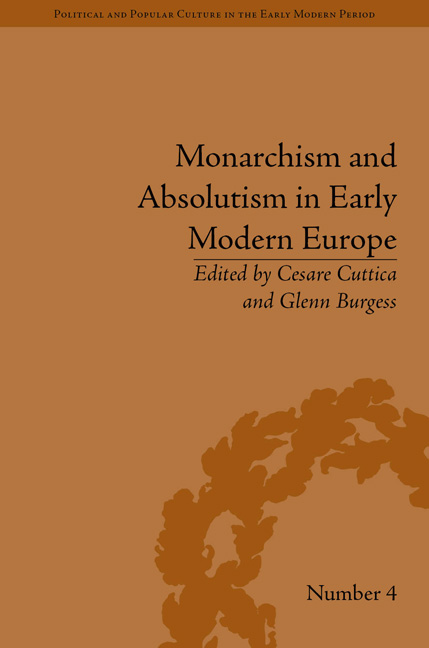Book contents
- Frontmatter
- CONTENTS
- Acknowledgements
- List of Contributors
- Introduction: Monarchism and Absolutism in Early Modern Europe
- Part I Royalists, Republicans, Patriarchalists: English Thinkers at Odds in the Seventeenth Century
- Part II Absolutism, Cynicism, Patriotism: Eighteenth-Century Enlightenment Reflections
- 4 Cynic Kingship in the German Enlightenment
- 5 Polizey and Patriotism: Joseph Von Sonnenfels and the Legitimacy of Enlightened Monarchy in the Gaze of Eighteenth-Century State Sciences
- 6 Absolutism, Patriotism and Publicity in Denmark-Norway in the Eighteenth Century: Jens Schielderup Sneedorff, Andreas Schytte and Frederik Sneedorff
- 7 Jansenist Jurisdictionalism and Enlightenment: Two Ways of Thinking Politics in Mid-Eighteenth-Century Naples
- Part III Absolutism, Monarchism, Despotism in Theory and Practice: Contested Historiography and Comparative Approach
- Part IV Monarchy, the State of Nature, Religion and Iconography in European Perspective
- Notes
- Works Cited
- Index
7 - Jansenist Jurisdictionalism and Enlightenment: Two Ways of Thinking Politics in Mid-Eighteenth-Century Naples
from Part II - Absolutism, Cynicism, Patriotism: Eighteenth-Century Enlightenment Reflections
- Frontmatter
- CONTENTS
- Acknowledgements
- List of Contributors
- Introduction: Monarchism and Absolutism in Early Modern Europe
- Part I Royalists, Republicans, Patriarchalists: English Thinkers at Odds in the Seventeenth Century
- Part II Absolutism, Cynicism, Patriotism: Eighteenth-Century Enlightenment Reflections
- 4 Cynic Kingship in the German Enlightenment
- 5 Polizey and Patriotism: Joseph Von Sonnenfels and the Legitimacy of Enlightened Monarchy in the Gaze of Eighteenth-Century State Sciences
- 6 Absolutism, Patriotism and Publicity in Denmark-Norway in the Eighteenth Century: Jens Schielderup Sneedorff, Andreas Schytte and Frederik Sneedorff
- 7 Jansenist Jurisdictionalism and Enlightenment: Two Ways of Thinking Politics in Mid-Eighteenth-Century Naples
- Part III Absolutism, Monarchism, Despotism in Theory and Practice: Contested Historiography and Comparative Approach
- Part IV Monarchy, the State of Nature, Religion and Iconography in European Perspective
- Notes
- Works Cited
- Index
Summary
At the end of the 1760s, the government wished to modernize Naples's state framework, just like the imperial court of Vienna and the other Bourbon monarchies of Madrid and Paris. This may allow us to say that in such a context the politics of reforms was inspired by an ideology that may be defined Jansenist jurisdictionalism. It was different from Enlightenment; it was a sort of Giannonism without Pietro Giannone (whose great Civil History of the Neapolitan Kingdom had appeared in 1723), but with a strong Jansenist influence; and one which had widened its initial perspective of civil history to economic and social problems from the 1740s. In this effort those governments tried to establish contacts with Enlightenment thinkers. And it was precisely this that occurred in Naples too. The creation of the King's Advocate (Avvocato del Re), a new office wanted in 1768 by minister Bernardo Tanucci and supported by Neapolitan Enlightenment thinker Antonio Genovesi, was part of this European process. As we shall see, it arose amid controversy, which revealed the disparity between the idea of reformation that Bourbon courts had in mind at the time, and the one that Enlightenment culture had spread across Europe. It also showed the ways in which Enlightenment culture and the policy of absolute governments tried to reach a point of contact. When this effort, too, ended in failure in 1776, with Tanucci's fall in Naples and Turgot's in Paris, it proved the degree to which the languages and horizons involved were different.
- Type
- Chapter
- Information
- Monarchism and Absolutism in Early Modern Europe , pp. 101 - 116Publisher: Pickering & ChattoFirst published in: 2014



